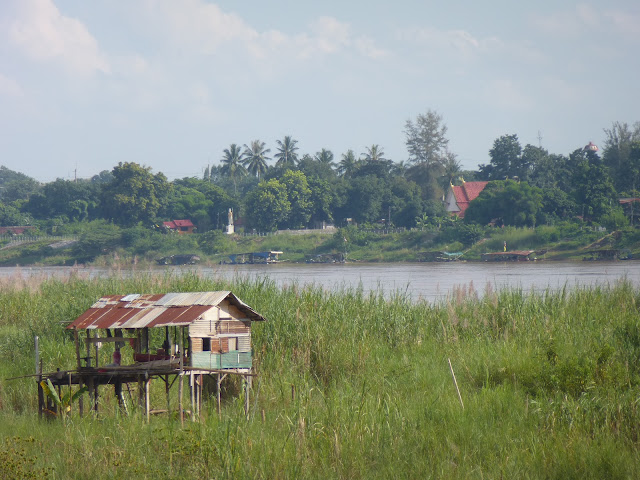Borneo: Monkeys vs Palm Oil
At one of our first visits to a bigger supermarket in Thailand I noticed long shelves with cooking oil. Not knowing which sort to choose i started to inspect some of the labels, which is actually not the easiest thing to do, as most of them are mainly in Thai. Shopping when coming to a new country can be quite time consuming... The result of my oil research was that most of the bottles contain palm oil! A shelf with hundreds or thousands of liters refined palm oil.
Around Christmas Swedes (not Swiss!) consume large amounts of gingerbread ("pepparkakor"). If you take the easy way and buy them in the store instead of making your own ones, you will find that many of the cookies contain palm oil. Just as so many other products. So, what's the problem? According to WWF (World Wide Fund for Nature) uncertified palm oil is problematic because it has led to huge areas of rainforest being devastated for giving space to oil palm plantations. This has very negative impact on the biodiversity in these places. Last year the Swedish Radio Unit did a test checking the ingredients of 15 different kinds of gingerbread. Eight of them contained palm oil, whereof three uncertified. Certified palm oil has less negative impact on biodiversity and social conditions. But does it matter if there are a few drops of palm oil in gingerbread in Sweden, when there are endless amounts consumed in Southeast Asia?
Last month we were on holiday in Malaysia, which is close to our country of service. We were quite excited to discover nature and wildlife in this part of Southeast Asia. But as soon as you leave the airport all you see is palm oil trees. After some nice days in Georgetown and four days on an amazing beach on a small island on the east coast we went to the eastern part of Malaysia, Borneo. We travelled by bus from Kota Kinabalu to Sandakan, stopping for one night in Kinabalu National Park and for two nights at Kinabatangan River. The bus ride is unfortunately quite boring. For hours you see only palm oil plantations. As far as the eye reaches, palm oil plantations. Knowing the fact that all these areas were once covered with rainforest is really heartbreaking. We spent two days right at Kinabatangan River which is Malaysias 2nd longest river and a great resource and natural habitat for many animals and plants. We stayed at an eco camp run by a local organization which helps to protect the forest habitat, wildlife and biodiversity of the Lower Kinabatangan while preserving the livelihood of the local population. During the river cruises we could spot several species of monkeys, crocodiles, birds and other animals. On the last day we could even see two wild orangutans in the trees of the rainforest! But these animals are threatened. The strip of rainforest along the river is only 50 meters wide. Behind this the rainforest has been replaced with palm tree plantations.
Before going home we spent a couple of days in Sandakan, where we visited Sepilok Orangutan Rehabilitation Centre. In the information hall they make a clear statement on what the biggest threat for orangutans is - you and I! Our behavior, our consumption, our choices in the supermarket affect the wildlife on Borneo and around the world. I am aware that this topic is not only black and white. However we need to be aware of and responsible in how we use the resources of the earth.
Around Christmas Swedes (not Swiss!) consume large amounts of gingerbread ("pepparkakor"). If you take the easy way and buy them in the store instead of making your own ones, you will find that many of the cookies contain palm oil. Just as so many other products. So, what's the problem? According to WWF (World Wide Fund for Nature) uncertified palm oil is problematic because it has led to huge areas of rainforest being devastated for giving space to oil palm plantations. This has very negative impact on the biodiversity in these places. Last year the Swedish Radio Unit did a test checking the ingredients of 15 different kinds of gingerbread. Eight of them contained palm oil, whereof three uncertified. Certified palm oil has less negative impact on biodiversity and social conditions. But does it matter if there are a few drops of palm oil in gingerbread in Sweden, when there are endless amounts consumed in Southeast Asia?
 |
| A long-tailed macaque on Borneo |
 |
| Kanabatangan River in morning light |
Before going home we spent a couple of days in Sandakan, where we visited Sepilok Orangutan Rehabilitation Centre. In the information hall they make a clear statement on what the biggest threat for orangutans is - you and I! Our behavior, our consumption, our choices in the supermarket affect the wildlife on Borneo and around the world. I am aware that this topic is not only black and white. However we need to be aware of and responsible in how we use the resources of the earth.
 |
| A wild orangutan having breakfast in a tree |
 |
| Palm oil tree with fruits |
 |
| Rainforest - a bit spooky, isn't it? |



Det är verkligen palmolja i så sjukt mycket i Sverige!! Godis, tvål, soppor, bröd, allt möjligt. Häftigt men hemskt att ni sett resultatet av palmoljeproduktionen på nära håll!
SvaraRaderaJa, det är verkligen i så många produkter. Men då är det ändå ingenting jämfört med palmoljekonsumtionen här i Asien...
Radera